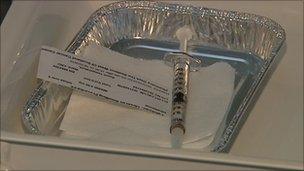Glasgow patients trial new brain cancer drug
- Published

The new drug will be trialled by patients at the Beatson Cancer Centre in Glasgow
Patients in Glasgow are to be the first to benefit from a new trial to develop a brain cancer drug that has been shelved by pharmaceutical companies.
The drug being tested at the Beatson West of Scotland Cancer Centre, IMA950, is designed to help the immune system fight glioblastoma, a deadly form of brain cancer.
Some 45 newly diagnosed patients will take part in the trial at the Beatson and up to four other UK hospitals.
Cancer Research UK funds the study.
Immatics Biotechnologies had shelved work on the drug before the charity stepped in.
Its cost is not being disclosed for commercial reasons, but a Phase I trial of this type usually costs about £2m.
More than 2,000 glioblastoma multiforme (GBM) tumours are diagnosed in the UK each year. It is one of the most common and most aggressive of primary brain tumours.
The prognosis for newly diagnosed patients is very poor, with survival often measured in months.
Calum Elliot, a 21-year-old patient of Beatson consultant Dr Allan James, will be the first to try the drug.
He said: "Hopefully it'll get me better and it could help other people get better in the future."
Dr James said the drug was designed to use the patient's immune system to try to fight the cancer, alongside the conventional treatments of radiotherapy, chemotherapy and surgery.
'Hardest parts'
"It's very exciting," he said.
"We've had a long history of being involved in brain tumour and other cancer research here at the Beatson and it's great to have the opportunity to be the first in the world to deliver this vaccine."
Nigel Blackburn of Cancer Research UK's drug development office, said: "It's really great news that we have launched this trial for a vaccine which could boost the current treatment for brain cancer.
"Using the immune system to fight cancer is an exciting area of research and something we are heavily investing in as a promising way to treat a broad range of cancers."
The study is being led nationally by Professor Roy Rampling, from the University of Glasgow.
He said: "One of the hardest parts of my job is telling someone they have brain cancer.
"Glioblastoma can be challenging to treat because there are limited options for therapy - there's a real need for new treatments for this disease."
Pharmaceutical companies often shelve drugs - sometimes because they have higher priorities, or because of mergers with other companies, or because the drugs are too expensive to continue with.
Cancer Research UK has signed agreements with six pharmaceutical companies so far to enable them to continue to work on promising treatments, which otherwise would have been dropped.
- Published18 October 2010